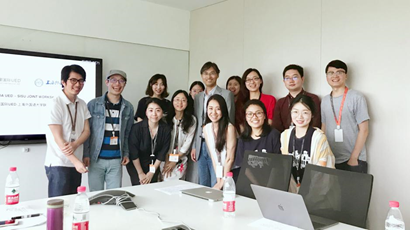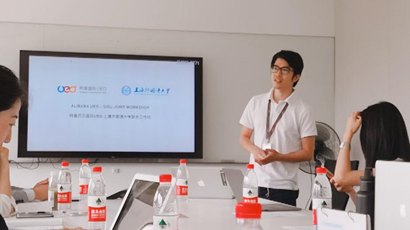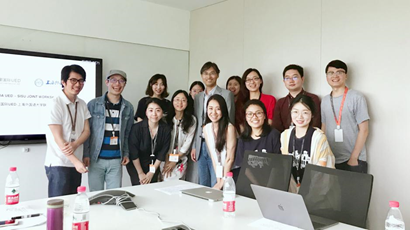On June 1, 2018, Alibaba International UED-The School of Education held the first joint workshop in the Xixi Park in Alibaba, Hangzhou. Led by Zhang Shouzhu, deputy secretary of the Party branch of the school, teachers Zhang Qiuhang, Jin Chaoyu, Zheng Qiong and the undergraduate students of Teaching Chinese to Speakers of Other Languages went to study at the Alibaba Group headquarters. This workshop exchanged insights and built consensus on the theme of “Language·Future”.

Dr. Zhang Wei of Alibaba International UED briefed everyone on the situation of the department and led the teachers and students of the School of Education to visit the Park. “Living Seriously, Working Happily”, Alibaba's vibrant and creative modern corporate culture left a deep impression on teachers and students.
Deputy Secretary Zhang Shouzhu of the School of Education briefed on the language advantages of the school and the construction of Double First-rate” universities, the professional settings of our school, the employment situation of graduates and outstanding alumni.
Alibaba International UED Director Mao Xiaoxiao firstly introduced Alibaba International UED's business system and innovations in the field of human-computer interaction, such as human-machine natural interaction laboratory and Costa coffee voice ordering machine, and pointed out the demand for linguistic talents and employment requirements.

In the next, Alibaba's technical tycoons shared and exchanged their experience. The first sharer was designer Chen Yaoxuan, who participated in the design of Tmall, Shanghai Metro voice ticketing and Costa coffee voice ordering system, and had considerable experience in artificial intelligence voice design. He mentioned that the voice design of the intelligent era is slowly helping our lives to become better. For example, voice transcription helped the Zhejiang courts to hear tens of thousands of cases. He further introduced Tmall's popular product Tmall Elf, referring to the linguistic problems encountered in the design process, such as the ambiguity of the user's expression language and the obstacles to the understanding of the machine. Finally, he said that user-led voice interaction was an important direction of today's intelligent voice design.
The second sharer was Wang Yihang, the translator of Voice User Interface Design: Conversational Experience Design Principles. He brought a lively and easy-to-understand voice user interface (VUI) design sharing to teachers and students. He detailed the design principles of the voice user interface, the indispensable character model design in the VUI design system, and some advanced knowledge in the field: voice recognition technology, natural language understanding, sentiment analysis and text-to-speech conversion strategy. “We have to prepare all the voice-related content in advance,” he said, “Then, whenever the users speak, their needs can be immediately met.”
The third sharer was Dr. Zhang Wan, a linguist who is currently responsible for the Alibaba’s voice ordering project. She combined this work experience to talk about the application of linguistics in speech interaction, including user speech behavior prediction, real language state, natural conversation structure and machine testing, and finally explored the differences of pitches of the friendly voice under different emotional conditions. Zhang Wan pointed out that the academic community had long used written language as the main research object, while linguistic research in speech interaction must be based on a large number of real conversations, from which grammar and conversation rules were extracted.

Teachers of the School of Education shared their current research areas in combination with their own linguistic professional backgrounds. Teacher Zhang Qiuhang introduced accessibility theory and Chinese discourse analysis, including the extraction and identification of language/psychology units, and the anaphora of Chinese texts. Ali R&D personnel were very interested in the theory of accessibility and discussed with Zhang how to apply the theory of accessibility to actual product design. Teacher Jin Chaowei explained the organization and extraction of psychological vocabulary. He started with the psychological dictionary and discussed the way the brain stored vocabulary and the strategies of understanding sentences. After that, they further discussed the linguistic theory of “users' core information extraction”.
After the sharing, Alibaba's R&D team and the teachers of the School of Education exchanged their insights. The Ali team's sharing of intelligent voice technology opened up ideas for language research and built a bridge between linguistics and industrial applications. The professional knowledge in the field of linguistics brought by SISU would also provide some theoretical support for intelligent research. This is not only a dialogue between SISU and Alibaba, but also a spark of linguistics and intelligent technology.
During the course of the activity, the teachers and students of the School of Education also visited two alumni working in the Alibaba Group.

